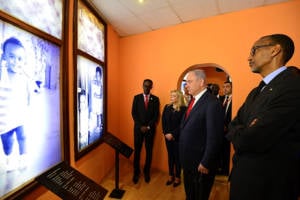During Netanyahu’s successful visit to Kigali, he dismissed U.S. condemnation of Israeli housing construction in Jerusalem, noting that Palestinian incitement is the reason there is no peace in the region.
Prime Minister Benjamin and Sara Netanyahu landed Wednesday morning in Kigali, the capital of Rwanda, where President Paul Kagame and his wife welcomed them at the airport along with an honor guard of over 100 soldiers. The Israeli and Rwandan national anthems were played.
Accompanied by the Rwandan president, the Netanyahus visited the Kigali Genocide Memorial, honoring the memory of more than one million Rwandans killed in 1994, including the wing dedicated to genocide in other countries and the Children’s Memorial Room. The Israeli prime minister signed the guestbook and laid a wreath.
The Israeli and Rwandan delegations discussed increased bilateral cooperation in various fields, including military and security, energy, infrastructures, cyber, agriculture and water. Their ambassadors signed the following bilateral agreements: Visa exemptions for diplomatic passport holders and memoranda of understanding on cooperation in innovation, research and development, and encouraging tourism.
“It’s an honor to be in your beautiful country,” Netanyahu stated at a joint press conference with Kagame. “You’ve visited Israel several times, and now it’s my great privilege to visit Rwanda… We had excellent discussions, very direct, about cooperation in agriculture, in water, in transportation, tourism obviously, and educational exchanges…and also questions I think that are important to the security of our countries.

Israeli PM Benjamin Netanyahu and his wife Sara visit the remembrance site for the victims of the Rwanda Genocide in 1994 in Kigali on Wednesday. (Kobi Gideon/GPO)
“I am deeply impressed with Rwanda,” he continued. “It’s a vibrant country. It’s a resolute country. And you’ve accomplished amazing things. And these achievements are even more impressive given the horrors that you had to overcome.”
Regarding his visit to the memorial, the Israeli leader commented on the “exceptionally moving, jolting…pictures of children, sometimes babies, their briefest life stories put before us. Families that were cut down by neighbors, murdered by people, they lived next to them all their lives. And there are haunting evocations of your tragedy with our tragedy,” he said, in obvious reference to the Holocaust.
“My people know the pain of genocide as well, and this is a unique bond that neither one of our peoples would prefer to have. Yet we both persevered. Despite the pain and despite the horror, we survived. We never lost hope; and you never lost hope. Today Israel and Rwanda are successful states and models for progress.”
Netanyahu noted that “genocide is preceded by incitement to mass murder. Words matter. They have the power to kill. And broadcast words, whether on the radio or now through other means, they have the power to kill even further. In Rwanda, radio broadcasts dehumanized people long before they were slaughtered. You asked for those broadcasts to be stopped as part of your battle against genocide, and you were unsuccessful.
“The Nazis, too, began dehumanizing Jews long before they started murdering millions of our people,” Netanyahu declared. “So today, when we see leaders in Gaza calling for the murder of every Jew around the world, we all have a duty to speak out. When we hear the Supreme Leader of Iran calling for the annihilation of Israel, we have a duty to speak out. We have a duty to alert the world to the danger of these hateful words.”

Netanyahu lays a wreath at the memorial to victims of the 1994 Rwandan genocide (AP)
In response to these dire threats, “we must be able to defend ourselves by ourselves. In Rwanda, UN peacekeepers failed to keep the peace. They not only failed to keep the peace, they failed to respond to urgent calls for salvation against an impending genocide. They ran away. We cannot, neither one of us, outsource our safety and our security.”
Rwanda and Israel, Netanyahu asserted, “are united in our fight against terrorism that threatens us all. We’re determined to work together in so many fields to secure a future of security, prosperity and peace for all our peoples.”
Asked by the press about the most recent U.S. condemnation of housing construction in Jerusalem, the Israeli leader declared: “We are familiar with the American position. It is not new. It is also not acceptable to us.
“With all due respect, it is neither the construction in Jerusalem nor that in Ma’ale Adumim that makes peace more remote. What prevents peace, first of all, is the constant incitement against the existence of the State of Israel within any borders, and the time has come for all the nations of the world to recognize this simple truth. There is also a second truth: The way to resolve conflicts is by direct negotiations.
“We are ready at all times to hold direct negotiations without preconditions with our neighbors; however, they are not prepared to hold them with us. These are the two things that are preventing peace – not a few apartments near the city of Ma’ale Adumim or several neighborhoods in Jerusalem.”
The visit to Rwanda is part of Netanyahu’s itinerary in Africa, which also includes Kenya, Uganda and Ethiopia.
By: United with Israel Staff
